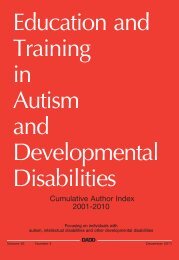etadd_47(3) - Division on Autism and Developmental Disabilities
etadd_47(3) - Division on Autism and Developmental Disabilities
etadd_47(3) - Division on Autism and Developmental Disabilities
You also want an ePaper? Increase the reach of your titles
YUMPU automatically turns print PDFs into web optimized ePapers that Google loves.
y students with intellectual disability (note, not<br />
disaggregated for students with MID) (Browder,<br />
Spo<strong>on</strong>er, Ahlgrim-Delzell, Harris, & Wakeman,<br />
2008), the last thorough review <strong>on</strong> academic<br />
mathematical instructi<strong>on</strong> for students with mildto-moderate<br />
intellectual disability predates the<br />
current decade <strong>and</strong> hence current reforms<br />
(Butler, Miller, Lee, & Pierce, 2001).<br />
Butler <strong>and</strong> colleagues (2001) reviewed the<br />
literature <strong>on</strong> mathematics educati<strong>on</strong> for students<br />
with mild-to-moderate intellectual disability<br />
published between 1989 <strong>and</strong> 1998. In<br />
the 16 articles found for these two populati<strong>on</strong>s<br />
during the time frame, Butler et al. found a<br />
shift in instructi<strong>on</strong>al focus from a curriculum<br />
based <strong>on</strong> basic skills (e.g., numeracy, mathematical<br />
symbols, equality, etc.) to a focus <strong>on</strong><br />
computati<strong>on</strong>al fluency <strong>and</strong> mathematical<br />
problem solving (e.g., tasks involving organizati<strong>on</strong><br />
<strong>and</strong> analysis of informati<strong>on</strong>). Further,<br />
Butler et al. noted the increased attenti<strong>on</strong> to<br />
developing students’ procedural <strong>and</strong> c<strong>on</strong>ceptual<br />
underst<strong>and</strong>ing, such as research supporting<br />
teaching students with mild-to-moderate<br />
intellectual disability through use of strategy<br />
instructi<strong>on</strong> for problem solving, self-regulati<strong>on</strong>,<br />
<strong>and</strong> the c<strong>on</strong>crete-semic<strong>on</strong>crete-abstract<br />
teaching sequence. The shift in instructi<strong>on</strong>al<br />
methods coincided with recommendati<strong>on</strong>s for<br />
shifting emphasis in mathematics educati<strong>on</strong><br />
in general, as supported by the Nati<strong>on</strong>al<br />
Council of Teachers of Mathematics (1989) as<br />
well as supported the positi<strong>on</strong> of researchers<br />
in special educati<strong>on</strong> who called for greater<br />
attenti<strong>on</strong> to problem-solving <strong>and</strong> the development<br />
of c<strong>on</strong>ceptual underst<strong>and</strong>ing (e.g., Jitendra<br />
& Xin, 1997; Woodward & Howard, 1994).<br />
The shifting emphasis of instructi<strong>on</strong>al<br />
methods for students with intellectual disability<br />
also aligned with research suggesting students<br />
with MID may possess strengths in mathematics<br />
regarding higher level thinking skills,<br />
such as the ability to create <strong>and</strong> maintain strategies,<br />
utilize metacognitive skills, <strong>and</strong> develop<br />
at least some levels of c<strong>on</strong>ceptual underst<strong>and</strong>ing<br />
of mathematical relati<strong>on</strong>ships <strong>on</strong> an abstract<br />
level (Baroody, 1996; Erez & Peled,<br />
2001). In a group study including twenty-four<br />
elementary, middle, <strong>and</strong> high school students<br />
with mild-to-moderate intellectual disability,<br />
some students were able to independently create<br />
more efficient strategies (e.g., short-cuts<br />
such as “counting <strong>on</strong>”) after receiving explicit<br />
instructi<strong>on</strong> for less efficient, more time-c<strong>on</strong>suming<br />
strategies (e.g., “counting all”) when<br />
working <strong>on</strong> single digit additi<strong>on</strong> problems<br />
(Baroody). Erez <strong>and</strong> Peled also found some<br />
middle <strong>and</strong> high school students with mild-tomoderate<br />
intellectual disability used metacognitive<br />
skills, such as reexamining choices<br />
made during problem solving processes <strong>and</strong><br />
basing future acti<strong>on</strong>s up<strong>on</strong> these reflecti<strong>on</strong>s,<br />
to solve additi<strong>on</strong> word problems. Some of<br />
these students also independently developed<br />
an underst<strong>and</strong>ing of the structure of these<br />
problems <strong>and</strong> the abstract mathematical relati<strong>on</strong>ships<br />
within the problems (e.g., part-partwhole)<br />
(Erez & Peled).<br />
While schools are expected to prepare students<br />
with MID for daily resp<strong>on</strong>sibilities <strong>on</strong>ce<br />
they leave K-12 educati<strong>on</strong>, students with MID<br />
also need a variety mathematical skills to meet<br />
dem<strong>and</strong>s placed up<strong>on</strong> them by educati<strong>on</strong>al laws<br />
(i.e., IDEA, 2004; NCLB, 2002) <strong>and</strong> high school<br />
graduati<strong>on</strong> requirements (Teuscher et al.,<br />
2008). Students with disabilities, including students<br />
with mild intellectual disability, need access<br />
to opportunities to develop c<strong>on</strong>ceptual underst<strong>and</strong>ing<br />
for success with more complex<br />
mathematics in middle school, high school, <strong>and</strong><br />
post-sec<strong>on</strong>dary educati<strong>on</strong> (Lesh et al., 1988;<br />
Vergnaud, 1983; Woodward & M<strong>on</strong>tague,<br />
2002). While Butler et al. (2001) indicated students<br />
with MID were receiving instructi<strong>on</strong> more<br />
rooted in mathematical c<strong>on</strong>cepts than in previous<br />
years, the questi<strong>on</strong> remains regarding<br />
whether students with MID c<strong>on</strong>tinued to receive<br />
instructi<strong>on</strong> needed to develop the foundati<strong>on</strong> in<br />
mathematics for success when c<strong>on</strong>sidering both<br />
procedural <strong>and</strong> c<strong>on</strong>ceptual underst<strong>and</strong>ing. The<br />
specific research questi<strong>on</strong> for this study is: What<br />
is the nature of the academic instructi<strong>on</strong> the<br />
students with MID have received in mathematics<br />
in the past 11 years?<br />
Method<br />
A systematic review of the literature was completed<br />
of academic mathematics interventi<strong>on</strong>s<br />
for students with MID from 1999 to 2010. The<br />
researchers chose this period of time as Butler<br />
et al. (2001) reviewed research <strong>on</strong> this topic<br />
through 1998 <strong>and</strong> multiple reforms impacting<br />
mathematics educati<strong>on</strong> occurred in the last<br />
decade (e.g., Comm<strong>on</strong> Core St<strong>and</strong>ards, 2010;<br />
IDEA, 2004; NCTM, 2000). Studies were in-<br />
Mathematics <strong>and</strong> Students with MID / 391

















